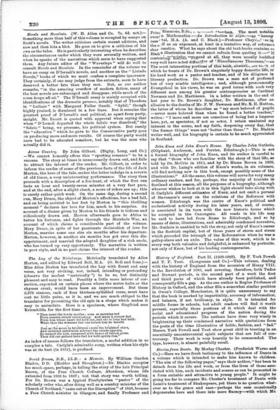Novels and Novelists. (W. H. Allen and Co. 7s. 6d.
net.)— Something more than half of this volume is occupied by essays on Scott's novels. The writer criticises certain recent editions, and now and then hits a blot. He goes on to give a criticism of his own on the tales. He is particularly interesting when he describes the circumstances under which they were severally written, and when he speaks of the narratives which seem to have suggested them. Any future editor of the "Waverleys " will do well to consult Novels and Novelists. In the remainder of the volume we have an essay on D'Israeli's novels, and another on the " Listado Novels," books of which we must confess a complete ignorance. They certainly, if one may judge from the extracts, seem to have deserved a better fate than they met. But, as our author remarks, "in the amazing overflow of modern fiction, many of the best novels are submerged and disappear, while much of the scum keeps afloat." The D'Israeli essay is mainly occupied with identifications of the dramatis persona', notably that of Theodora in " Lothair " with Margaret Fuller Ossoli. " Sybil," though highly praised, is dismissed in a few lines. But it remains the greatest proof of D'Israeli's real political, as apart from party, insight. Mr. Escott is quoted with approval when saying that when " D'Israeli departed the whole fabric was dissolved," the "fabric" being, we presume, his political system. But surely the " education " which he gave to the Conservative party goes on producing more and more results. Of course the party would have had to be educated somehow, but he was the man who actually did it.


































 Previous page
Previous page